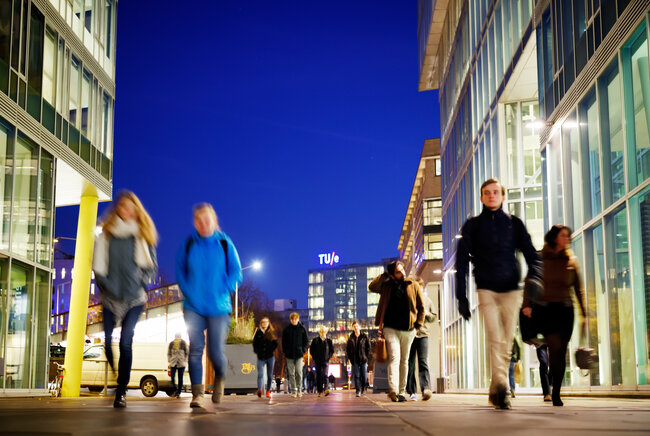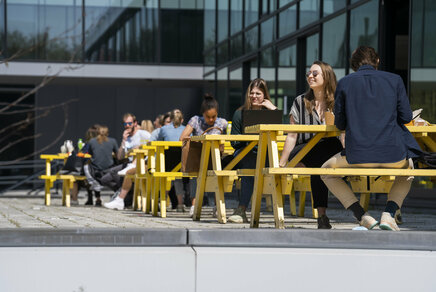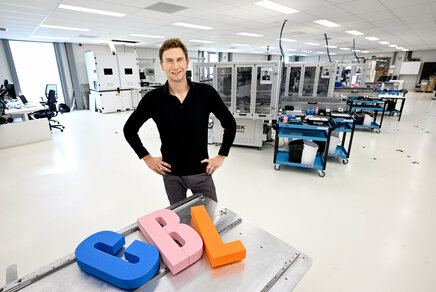Third round National Growth Fund: over 2.4 billion euros awarded to projects in which TU/e is involved
Eleven project proposals with TU/e contribution receive investment in third round.

A whopping eleven project proposals with a TU/e contribution will receive investment in the third round of the National Growth Fund. This is more than in the previous two rounds. It concerns a total amount of more than 2.4 billion euros, adding that part of this amount has been granted under conditions. This means that some proposers still need to take additional steps before they actually receive the earmarked amount.
Through this fund, the government is investing 20 billion euros between 2021 and 2025 in projects that will ensure long-term economic growth. In the third round, a total of 4 billion euros has been awarded to 18 project proposals, Minister Micky Adriaansens (Economic Affairs and Climate) announced. A total of 2.6 billion euros will go specifically to research, development and innovation in the areas of climate, energy, high tech, digitization and healthcare.
The eleven projects are:
Delta Plan Valorization
The Netherlands is among the top 3 European countries in the field of knowledge creation, which is an extremely strong asset. But it is much less successful in translating this knowledge into social and economic added value. This project aims to break through this apparent contradiction and reinvigorate the situation. A broad consortium has the ambition to make four times as much impact, by setting twice as many valorization projects in motion and, through better support, ensuring that twice as many projects are successful.
The National Growth Fund is investing up to €417 million in the project. This amount is a reservation.
Involvement from TU/e: Christian Staupe (The Gate)
6G Future Network Services
Following the development of 5G mobile networks, work is currently beginning around the world to prepare for 6G, the next generation of mobile expected to hit the market in 2030. State-of-the-art mobile networks ensure that we can all benefit from the opportunities offered by digitization. They contribute to the growth of our earning power in all sectors of the economy. With the Future Network Services (FNS) program, the Netherlands is creating its own and important position in this development, focusing on those areas where the Netherlands can distinguish itself. This ultimately contributes to the digital autonomy of the Netherlands and the European Union.
The National Growth Fund is investing up to €203 million in the project. This amount consists of a conditional allocation of €61 million and a reservation of €142 million.
Involvement from TU/e: Bart Smolders (departments Electrical Engineering and Mathematics & Computer Science)
Material Independence & Circular Batteries
Battery technology plays a crucial role in the energy transition as a storage system for green energy. For stabilizing the electricity grid and for the electrification of the mobility sector. The Material Independence & Circular Batteries proposal focuses on realizing a strong position for the Dutch manufacturing industry in the global battery chain, with sustainability and circularity at its core. This is essential to achieve climate goals and sustainable economic success in the Netherlands.
The National Growth Fund is investing up to € 296 million in the project. Of this amount, € 118 million has been conditionally allocated and € 178 million as a reservation.
Involvement from TU/e: Antoni Forner Cuenca, Theo Hofman, Pascal Etman, Tijs Donkers,Henk Jan Bergveld, Adriana Creatore, Kitty Nijmeijer, Patrick Anderson (departments Electrical Engineering, Mechanical Engineering, Chemical Engineering & Chemistry, Applied Physics & Science Education, EAISI institute)
Center for Animal-Free Biomedical Translation (CPBT).
The translation of biomedical knowledge to patient and user delivers new drugs, medical technology and food. This is good for our health and economy. Animal experiments are currently an important link in the biomedical development pathway, but are increasingly under pressure. They are often not a good model for application, cost a lot of time and money and cause animal suffering. To continue to improve human and animal health, a radically different approach is needed: to make the step to humans and animals better and faster without relying on animal testing as the gold standard.
The National Growth Fund is investing up to €125 million in the project. This amount is a reservation.
Involvement from TU/e: Keita Ito (department Biomedical Engineering)
POLARIS (Pathway toward Opportunities for Large scale Applications of Radically integrated systems).
POLARIS realizes new technological breakthroughs that allow the Netherlands to build on its technological and economic leadership in making complex microelectronic 'Radio Frequency' (RF) systems for MRI, radar and telecommunications. POLARIS strengthens the growth potential within high-tech sectors in which Dutch companies are already among the top three worldwide and connects the ecosystems involved.
The National Growth Fund is investing up to €102 million in the project. This amount has been conditionally granted.
Involvement from TU/e: Bart Smolders (department Electrical Engineering)
Creative Industries Immersive Impact Coalition (CIIIC).
Immersive Experiences (IX) are seen as one of the drivers of the third major digital transition, which will have a major impact on our daily lives, work, learning and recreation. An Immersive Experience appeals to our senses, mentally moving us into an alternative, digital reality. The CIIIC proposal addresses the bottlenecks that threaten a Dutch leading position in IX: a shortage of applicable knowledge and methodology; a shortage of human capital; a still fragmented ecosystem and therefore a shortage of projects where knowledge, human capital and partnerships are built.
The National Growth Fund will invest a maximum of €200 million in the project. This amount is a conditional allocation.
Involvement from TU/e: Jurgen Ganzevles, Erik van der Spek, Max Birk, Bart Hengeveld, Pavlov Bazilinksky (department Industrial Design and EAISI institute)
National Approach to Professionalization of Teachers
Good education and an educated workforce are the foundation of our prosperity and well-being. Good teachers are essential for this. The development opportunities and therefore the development of teachers in primary education, secondary education and senior secondary vocational education is now highly fragmented. Moreover, it is not in line with scientific insights. This project will help teachers in their professional development after they have obtained their initial qualification. This leads to better education and also makes the teaching profession more attractive. Thus, the project also contributes to reducing the teacher shortage.
The National Growth Fund is investing up to €160 million in the project. This amount consists of a final allocation of € 73 million and a conditional allocation of € 87 million.
Involvement from TU/e: Nienke Nieveen (department Applied Physics & Science Education)
SolarNL: Circular integrated high-efficiency solar panels
Energy from sunlight (solar PV) plays a key role in the transition to renewable energy. Globally, solar PV is growing rapidly and the capacity in the Netherlands is increasing substantially. This proposal focuses on the development and industrialization of new solar PV technologies and provides for the development of the next generation of fully circular solar panels. The next generation of solar panels is fully circular, has very low CO2 emissions, can be integrated into facades or car roofs, for example, and is much more efficient, requiring less space.
The National Growth Fund is investing up to €412 million in the project. Of this amount, €135 million has been granted definitively and €177 million conditionally. In addition, €100 million has been reserved for a possible loan for one of the consortium participants.
Involvement from TU/e: René Janssen, Erwin Kessels, Adriana Creatore (EIRES institute)
Investing in the talent of the future
There is a major shortage of talent in the STEM field in the labor market. This shortage directly affects many pressing societal shifts. Moreover, many future proposals within the National Growth Fund require STEM talent to realize the intended impact. The proposal "Investing in the Talent of the Future!" aims to expose all primary and secondary school age children and youth to the opportunities of (natural) science, engineering, technology and ICT. This gives every pupil a chance to develop talents and to participate fully in our society, which is becoming increasingly technological and digital in all facets. The connection to practice and to the social context (such as climate/sustainability) is always made.
The National Growth Fund has earmarked up to €352 million for a renewed plan.
Involvement from TU/e: Lilian Halsema
Charging Energy Hubs
The demand for electricity and renewable energy is increasing for vehicles that do not emit CO2. The current electricity grid and laws and regulations are not yet geared to this increasing demand. The proposal seeks to address this problem by developing so-called Charging Energy Hubs. These will enable the integration of charging infrastructure, battery storage and renewable energy sources within the existing grid.
The National Growth Fund is investing €44 million in the project.
Involvement from TU/e: Theo Hofman, Mauro Salazar, Guus Pemen, Maurice Roes (departments Electrical Engineering and Mechanical Engineering)
Growing with Green Steel
By implementing circular chains and reducing emissions, Growing with Green Steel aims to accelerate the transformation to a sustainable steel sector by five years and thereby build a strong international competitive position. The project does this by focusing on innovations through manufacturing companies that help reduce the sector's CO2 and other harmful emissions and reuse raw materials.
The National Growth Fund is investing €124 million in the project.
Involvement from TU/e: Mark Geers, Niels Deen, Philip de Goey, Johan Maljaars (departments Built Environment, Mechanical Engineering, institute EIRES)
Media contact
Latest news


